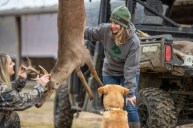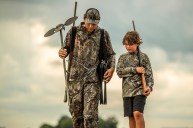This is the season to mentor a new hunter.
Hunter numbers are in serious decline. Enough that you and every other hunter out there should be concerned about it. There simply aren't enough new hunters coming into the tradition to replace those who leave.
What can we do about it? There is only one way. We must get busy mentoring new hunters.
Here is why you should take someone out for their first time hunting this year if you've never served as a hunting mentor before.
Teach hunting ethics and skills
Even if the person you mentor doesn't take to hunting permanently, I still think it is worth it to get someone in the woods. There is a lot of misinformation out there about exactly what hunting entails, and especially about hunting ethics, which are almost never discussed.
The general public simply does not understand what hunting does to help protect our natural resources, nor do they understand how funds from hunting licenses and other fees help fund state wildlife agencies, wildlife conservation, and the public lands that everyone enjoys.
Some hunters may consider their efforts wasted if someone they shadow through a mentored hunting program doesn't stick around for the following deer hunting season. But I don't see it that way.
They will have learned hunter education and gun safety on the shooting ranges, which are both valuable wilderness skills to have whether they go afield with a gun or bow in hand again or not. They'll also understand that a hunt is not just about harvesting an animal, but about making a connection with nature.
But most important, they'll be able to pass along pertinent information to others about hunting in the future. Even if their first deer is their only deer, they'll be able to educate other misinformed individuals either in their workplace or through social media about the wildlife management benefits of hunting they learned from more experienced hunters.
Let's face it, hunters are often heavily criticized. We need all the allies we can get. Participating in a mentoring program helps get more people on our side.
You'll be providing opportunities and making new friends
One of the biggest hurdles in hunting is simply gaining access to a place to hunt. If you have access to a place to hunt and can provide hunting opportunities for others, that's a huge headache taken care of right off the bat. The new hunter can then fully relax and keep their focus on enjoying the outdoors and harvesting that first big game or even small game animal.
For some people, it's the first hunt that hooks them for life. But if someone can't gain access to a quality hunting area through a good hunt program, they may never get that experience and realize what they are missing out on.
I often wonder how many new hunters quit out of frustration after going to public land totally unprepared for the challenge. The competition can be fierce on public land. New hunters may see nothing, and it may lead a new hunter to quitting before they really get started.
Newer hunters who have a mentor that helps them work through the frustrating learning curve of hunting in tough places like that are a lifesaver. And if you're able to provide a good private land setting, I feel they are even more likely to return to the field. Plus, you'll have made a new friend for life after you've bonded through their first hunt.
Someone must eliminate the learning curve
Let's face it, hunting has probably the steepest learning curve of any outdoor activity one can partake in. It's probably a little easier to learn on your own these days through the advent of the internet, but there are some things that can't really be taught, be it on YouTube or a hunter education course. They must be shown.
Good mentors can observe and correct problems in a new hunter's shooting stance or their anchor point with archery gear. They can explain exactly why that deer or coyote circled downwind. They can step in to correct a new hunter's inevitable mistakes in field dressing or prepping animals for the dinner plate.
For a new hunter's first deer, they may get a little too excited and forget to mentally mark where the animal was standing when they shot, leading to a tough tracking job. Mentored hunts mean there is someone there to cover for mishaps like that which could lead to lost game.
Simply put, there are lot of intangibles that can only really be learned one of two ways. The first is the hard way, through brutal mistakes. No one really wants that, or wants it to last a long time. The second way is through the watchful eye of someone with experience. That option is probably more likely to result in more hunters sticking with hunting for life.
We MUST bring more hunters into the fold
Here are some cold hard facts I've cited before from my home state of Michigan. In 2000, just one year into my hunting career, there were some 758,291 licensed hunters in the state. By 2015, the number dropped to 607,113. That means 151,178 hunters hung up their coats, guns and bows in less than two decades.
When you start crunching the numbers, the result is a loss of millions of dollars in funding for state wildlife agencies. That means less money to protect our natural areas and the fish and wildlife we all know and love. Hate the concrete jungle that seems to be creeping into previously country areas everywhere? Well, the loss of hunters is doing that no favors.
The percentage of hunters lost in Michigan is similar in most other states, and it can have a devastating effect. Colorado, for instance, cut many federal jobs and million-dollar programs designed to fight invasive aquatic species that damage natural populations of fish and plant life that live in the state's lakes and streams.
As hunter numbers go down, deer and other big game animal populations go up. Urban deer culls are becoming more and more common as deer numbers go up, and hunters simply can't keep up to keep them in check. It leads to the spread of more disease and more car-deer accidents as the animals move into areas they previously didn't inhabit. It also leads to property destruction as the animals exhaust their natural food sources and move into agricultural areas and people's flower gardens for sustenance.
Those disasters lead to higher insurance costs for your vehicle and more expensive costs at the lawn and garden or grocery store as wild game wipe them out. There is a huge trickle-down effect from the dwindling number of hunters in this nation, and future wildlife populations may be incredibly out of whack hundreds of years down the line if we don't take steps to reverse course now.
Beyond the natural and economic impacts of hunting however, you owe it to others to keep the hunting tradition alive. It's not just an American tradition, but a world tradition with skills that are quickly being lost as less and less people venture into our wilderness areas.
I don't think we should just concentrate on youth hunting for mentoring new hunters either. Let's not forget about adult hunters. There may be many older people out there who have always wanted to try it, but just never had someone to teach them how. Let's help them out!
We owe it to ourselves and the outdoor areas we love and cherish to do our part to help preserve them. So, this year, let's work to mentor and really cultivate hunting interests in new people. With a little hard work, it will blossom and grow into the next generation of conservationists. And it will help preserve those natural areas we all know and love for future generations to enjoy.
How to get started
Almost every state wildlife agency has recognized the importance of mentoring in getting new people afield, and it's quite easy to volunteer your time to the cause. Check your local state wildlife agency website or give them a call for more details. Likely, they'll be more than eager to connect you with people willing and eager to hunt.
Let's work to mentor and really cultivate hunting interests in new people. With a little hard work, it will blossom and grow into the next generation of conservationists.
For more outdoor content from Travis Smola, be sure to follow him on Twitter and check out his Geocaching and Outdoors with Travis Youtube channels.
NEXT: 5 FACTS TO SHARE WITH NON-HUNTERS
WATCH




